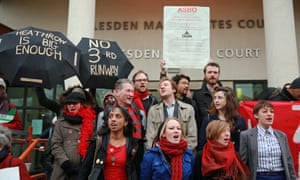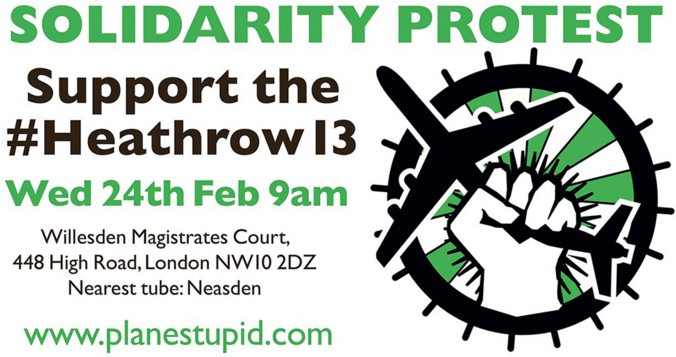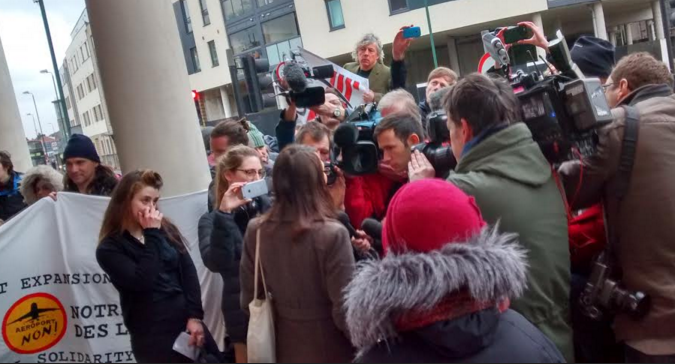However, since then plans to expand Heathrow have flown beyond reason, and the recently-approved £17bn airport expansion means an additional 250,000 more flights a year, the demolition of 783 homes despite Britain’s current housing crisis, and the destruction of most of the neighbouring village of Harmondsworth.
.
This raises an interesting point regarding cost and consequences that doesn’t take into account the great looming elephant in the room that is climate change.
There are no easily calculable figures to show the cost to our planet from the additional 250,000 flights a year or the health costs and consequences related to the increased pollution that the new runway will bring.
Nor did Judge Wright mention the fact the London exceeded its 2016 NO2 pollution limit by the 8th day of this year.
The commitments by the UK to emissions reductions look laughable, if increased global droughts and floodings were something we could laugh about. The consequences, then, need a different measure for the scenario relating to the impact of increased carbon pollution levels on human and animal health, and the warming of our planet. I’d say the word ‘astronomical’ was more fitting regarding this impact, since 2016 is already expected to be the warmest year on record, following in 2015‘s stead.
It’s difficult not to divert the discussion to vested interests – and others have speculated that the might of the aviation industry may be a factor at play regarding the government’s reversed decision on the airport expansion. But cost and consequences due to climate change, as the result of a third Heathrow runway, should definitely be a prominent focus. The UK’s increased CO2 emissions will contribute to climate related death and suffering the world over. The other prominent focus should be the failure of our governing bodies to do anything to prevent it.
Additionally, the consequence of this verdict on the Heathrow 13 spits on British freedom to effectively protest against CO2 emissions increases, because Plane Stupid were tipping the scales in favour of reason when they “locked on” for the climate. Now that has been interpreted to be a bigger crime by the British justice system.
In reality there is no bigger crime against our planet than climate change, and no greater injustice than the death and suffering it continues to bring.
In response to the original decision to go ahead with the runway, Sarah Shoraka of Plane Stupid said: ‘We need to insert climate change into the narrative. It has been absent from the whole debate ever since the Airports Commission report [approving the airport expansion] came out.’
Plane Stupid’s statement after the verdict states: ‘Today’s judgement demonstrates that the legal system does not yet recognise that climate defence is not an offence…Climate change has already claimed many lives, and it is the continued negligence of governance that forces citizens to act in their stead.’
The British legal system has it wrong here, and the aviation activists are in the right. We need to ensure that our governments enforce emissions limits, and that they prioritise health and planetary welfare over perceived profit. We need to stop prioritising foreign investors over local residents and global responsibilities, and to hold those who are driving emissions increases to account. Climate change should form a significant part of the dialogue when costs and consequences are assessed.
In addition to this, we need more people to take a stand against the bullying might of the industries that are trashing our only planet. And we need more voices to be heard in defence of our only home.
Sending the Heathrow 13 to prison? That’s just plain stupid. And it won’t stop them either – as they said after the verdict, they’re ‘in it for the long haul.’ In terms of the planet, so are we all.
—
The Heathrow 13 face what they call ‘an unusually harsh sentence’ on 24th February, of a minimum of three months in prison each. Find them on Twitter @planestupid and on Facebook.
http://www.huffingtonpost.co.uk/zion-lights/heathrow-expansion_b_9073574.html
.
.
Earlier:
“Heathrow13” climate protesters found guilty of aggravated trespass – sentencing 24th February, possibly for prison
Thirteen members of the Plane Stupid campaign group who occupied the eastern end of Heathrow’s northern runway on 13th July 2015 have been found guilty of aggravated trespass and entering a security-restricted area of an aerodrome. They have been told it is almost inevitable they will face a prison term. Their defence had been that their actions were intended to prevent death or serous illness to people. However, district judge Deborah Wright (who sat alone) said the cost of the disruption at Heathrow was “absolutely astronomical”. Those convicted were clapped and cheered as they left the court. They have been bailed to appear for sentencing on 24 February. A statement released by the #Heathrow13 following their convictions read: “Today’s judgement demonstrates that the legal system does not yet recognise that climate defence is not an offence. We took action because we saw that it was sorely needed. When the democratic, legislative and processes have failed, it takes the actions of ordinary people to change them.” They say instead of the government taking action to cut carbon emissions, it is intending to spend millions making the problem bigger, if another runway is allowed. Though the judge recognised “They are all principled people” she considered what the protesters did was “symbolic and designed to make a point, not to save lives”.
Click here to view full story…
and
The Heathrow ‘hooligans’ are our modern day freedom fighters

Supporters of the Heathrow runway protesters on trial for aggravated trespass and being in a restricted area of Heathrow airport without permission. Photograph: Mark Kerrison/Demotix/Corbis
By George Monbiot
Wednesday 20 January 2016
They have been reviled as vandals, hooligans and lunatics. But to me, these people are heroes. The 13 women and men on trial this week for cutting through the perimeter fence around Heathrow airport and chaining themselves together on a runway were excoriated by police, passengers and politicians. (One of the defendants in the case is a member of the cooperative society that rents my house.) If convicted, they all face a possible prison sentence. But there are two trials here: the legal proceedings in a local magistrates court, and a test of something much bigger.
Aviation enjoys some astonishing exemptions from the civilising rules that constrain other sectors. Other industries must limit the noise they make; but aircraft, thanks to an obscure clause in the 1949 Civil Aviation Act, are exempt. Other industries pay duty on the fuel they use; but even when air passenger duty is subtracted, aviation’s various tax holidays amount to a subsidy of some £7bn a year, forgone by the Treasury. Some industries must limit the air pollution they produce; but while in principle airports are subject to pollution laws, in practice they have been allowed to breach them routinely for years. (In this case the legal immunity also seems to extend to motor traffic.)
Most importantly, international flights are free from all climate constraints. They are covered by neither domestic legislation nor international agreements. There are no targets, no timetables, no limits. Airlines operate in a legislative vacuum, a transnational, extralegal limbo, accountable nowhere and to no one. As a result they threaten everything that was agreed at December’s climate talks in Paris.
Aviation accounts for roughly 6% of the UK’s greenhouse gas emissions, and 2% of the carbon dioxide produced by people globally. But as this industry expands while emissions from other sectors are cut, a study commissioned by the European parliament expects it to produce 22% of the world’s CO2 emissions by 2050, unless there is a sharp change in policy. That’s enough to push us past the thresholds our governments promised to avoid.
At one point the draft Paris agreement contained a paragraph about aviation and shipping (another unregulated industry). By December this paragraph had disappeared, without public explanation or debate. The final agreement simply fails to mention either industry.
Governments left the issue instead to the UN’s International Civil Aviation Organisation, a body whose apparent purpose is not to make progress but to impede it. Dominated by the industry it is supposed to regulate, its work is an exercise in finely calibrated uselessness: it makes just enough noise to create the impression of something being done, without actually changing anything.
It has three main policies. The first is to offset the greenhouse gases planes release by encouraging other sectors to make bigger cuts, in lieu of those that aviation refuses to accept. It’s not just that this policy is likely to be unachievable, as the targets agreed for other sectors in Paris will be tough enough to reach. It is also unjust. Why should this sector, used mostly by the world’s richer people, be allowed to dump its responsibilities on the rest of the economy?
The second is replacing mineral jet fuel with biofuel. Already road fuels made from plants have helped to destroy the forests of Indonesia and west Africa, strip soil off the land, evict local farmers and spread starvation, as plantations of palm oil, maize, sugar cane and other crops grown to feed cars have replaced those grown to feed people. Already, governments envisage covering great tracts of the planet’s surface with energy crops to burn in power stations: a plan that’s as fanciful as it is destructive. Now they want to power planes this way as well? Will any corners of the planet be reserved for food production and wildlife?
The organisation’s third policy is promoting speculative and often unfeasible aviation technologies, that are highly unlikely to materialise. Perhaps we could call them mumbo-jumbo jets.
Because of the physical and technological constraints, the only way in which we can realistically reduce aviation’s greenhouse gases is to fly less. You might not have imagined, in the 21st century, that we would still need to hoist 180lb of human flesh 30,000 feet into the air every time we want a conversation. I’ve been limiting my own flights to one return ticket every three years. Yes, it has sometimes cost me opportunities and income, but this restraint has made me no less happy or fulfilled. If we can only challenge our sense of entitlement, I believe we inflict no damage on our lives by taking to the air less often.
But rather than seeking to manage demand, our government, like most others, aims only to meet its own inflated forecasts. It claims that the 219m passenger journeys through the UK’s airports in 2011 will rise to 445m by 2050, and it hopes to build enough capacity to accommodate them. In doing so, it vitiates every promise it has made about preventing climate breakdown.
Last month the government delayed its decision on a third runway at Heathrow, ostensibly because of concerns about local pollution (though the real reason was to avoid sabotaging the Conservative candidate’s campaign to become London mayor). But this represents no change in policy: Cameron intends to build the new capacity somewhere, even if it’s not in west London.
Each of aviation’s exemptions is a democratic deficit: a failure to hold the industry responsible for the harms it causes. So what are citizens to do, where the writ of government does not run? Sit back and watch? By doing so, we commit a disservice to democracy. A breach of the contract between state and citizens becomes normalised and ratified by our inaction.
Two verdicts will emerge from this trial. One will concern the legal status of what the protesters did, and there is no way of knowing what it will be. The other will concern the moral status. I suspect that if they are locked up then history will pass the same verdict upon them as it has passed upon suffragettes, Chartists, the pioneers of trade unionism, and civil and gay rights activists. Vilified, prosecuted, but – in the court of public opinion – ultimately vindicated: this is what happens to the heroes of democracy.



